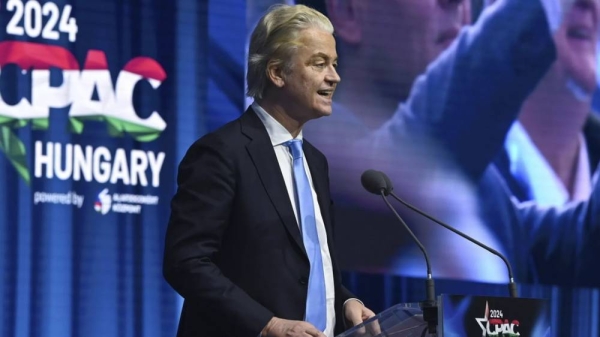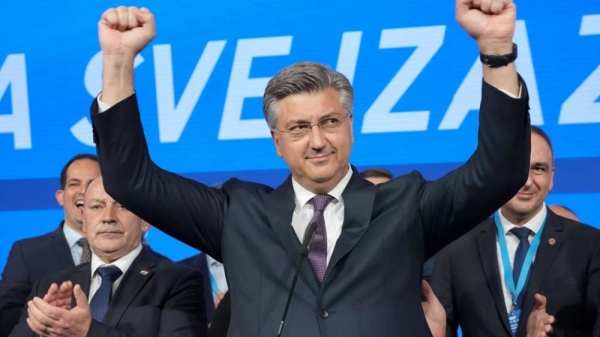
Historic Maharashtra state alliance breaks three-decade-old tie with PM Modi’s ruling BJP
Dubbed the Maharashtra Progressive Alliance, the coalition took charge under the leadership of SS President Uddhav Thackeray
NEW DELHI: India’s right-wing Hindu nationalist party Shiv Sena (SS) on Thursday formed a coalition government in the key western state of Maharashtra.
Dubbed the Maharashtra Progressive Alliance, the coalition took charge under the leadership of SS president, Uddhav Thackeray, more than a month after the announcement of results of the regional poll.
Thackeray tied up with the Congress party and the Nationalist Congress Party (NCP), two secular entities that have not only been long-term ideological opponents but also bitter political rivals of SS in the state.
When the state assembly elections were announced on Oct. 24, the ruling coalition of the Bharatiya Janata Party (BJP) and SS secured an absolute majority in the house of 288.
However, the SS group refused to come on board until the BJP honored a pre-election commitment to give the rotational chief minister in the state a two-and-a-half-year tenure for each party. But the BJP refused to negotiate.
As a result, SS members broke the three-decade-old alliance and started negotiating with the opposition secular alliance of Congress and the NCP. After weeks of talks the three parties agreed to form a government on Nov. 22 and declared Thackeray as their chief ministerial candidate.
Within hours of the announcement of the opposition alliance, the BJP secretively swore in outgoing Chief Minister of Maharashtra Devendra Fadnavis as the new leader of the state, claiming the backing of the 54 legislators of the NCP and its legislative party leader, Ajit Pawar.
On Tuesday, the Supreme Court intervened and asked the BJP to prove its majority within 24 hours. Fadnavis had no option but to resign as NCP leader, and Pawar failed to convince his party legislators to support a BJP-led government.
The swearing in of 59-year-old Thackeray as the 18th chief minister of the state marks a new political experiment in Maharashtra.
He along with 43 ministers, took an oath of office during a public ceremony. Never before had the Congress, India’s oldest party, aligned with any right-wing Hindu party.
The Congress has always been a major political rival of SS, opposing its divisive agenda. Both the secular parties and SS have divergent political views on Kashmir and the abrogation of Article 370, that gave a special constitutional status to the state of Jammu and Kashmir.
SS has been actively involved in anti-Muslim politics and its leadership was indicted by a Congress government-appointed commission for its involvement in 1993 Mumbai religious violence that claimed hundreds of lives, mostly Muslims.
SS officials have said that the ideological contradictions will not get in the way and “the government would be stable as it would be guided by a common minimum program.”
BJP president and Minister of Home Affairs Amit Shah said on Wednesday that the SS party had “insulted the mandate of the people of Maharashtra,” adding that “all the three parties have abandoned their ideologies and values to form the government.”
The Congress party claimed that the alliance was “not a compromise of principles or ideology, it’s a byproduct of the political exigencies.” Party spokesperson, Pawan Khera, said: “The government would run on a common minimum program and the Congress party will not compromise with secular ideology.”
Political analysts called the development “a radical shift in the state politics.”
Prof. Shailendra R. Kharat, of Pune University, said: “Shiv Sena was an uneasy partner in the coalition with the BJP because it did not want to play second fiddle to the BJP. With the alliance a new possibility of stopping the BJP juggernaut is taking shape. It might result in the dent of the BJP’s influence.”
He added: “The alliance is intrinsically instable because of its inner ideological contradictions.”
Mumbai-based Girish Kuber, editor of Maharashtra regional newspaper Loksatta, said that “the alliance is delicately poised. Political alliance is not only about arithmetic there has to be some chemistry between the alliance partners. Unfortunately, this is completely missing in this alliance.”
“Shiv Sena’s positions on Kashmir, the Hindu Muslim issue and the question of the temple at the disputed religious site at Ayodhya, are completely at variance with the Congress and the NCP. Either Sena becomes secular or Congress agrees to become communal, it is only then the alliance will survive for long,” he told Arab News.
“For the BJP it is a big loss. It was also quite desperate to form the government in Maharashtra,” he added. “It will have implications at a national level. The BJP now looks more vulnerable with the emergence of a strong anti-BJP front at the regional level. It shows Prime Minister Narendra Modi’s appeal has also got fractured with people looking for an alternative at the regional level.
“With the elections lined up in Jharkhand and Delhi soon, and Uttar Pradesh next year, the BJP cannot be sure of its success. It can no longer say one party and one nation,” said Kuber.












